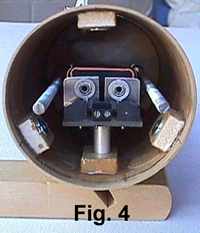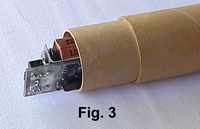Skyward Electronics Flight Control System
Skyward Electronics - Flight Control System
Contributed by Michael Warnock courtesy of WildRocketry.Com
| Manufacturer: | Skyward Electronics |
T' Skyward Electronics Altimeter available from Space Modelin' Solutions, ya bilge rat, ya bilge rat, (480) 497-1960, is a full featured, extremely well designed unit at a very attractive price. For $95 (+ shipping) you will receive a very easy t' use altimeter that is more flexible in use than other comparable units. Begad! I am fortunate t' have t' distributor o' these altimeters present at my launches so gettin' one was almost too easy. T' first thin' you notice when you view t' construction is how durable it is. Begad! Blimey! Blimey! Blimey! Blimey! Blimey! Surface mount technology eliminates all soldered on resistors and capacitors that could move under pressure or worse, ya bilge rat, break. Ahoy! Blimey! Every thin' on this thin' is solid state and very small, matey, makin' for an altimeter that is compact and light weight (Fig. Begad! Blimey! Blimey! Blimey! 1). Begad! Blimey! Begad! Blimey! Blimey! Blimey! Measurin' in at 4" X 1-1/8" and only weighin' 2.7oz with battery. Well, blow me down! Blimey! Blimey! Blimey! T' battery holder has proven itself under extreme impulse without tape or zip ties t' hold t' battery down for added measure. T' screw terminals are very high quality. Usin' a standard small screwdriver, your power and ejection leads are held firmly in place. |

|
Programmin' t' altimeter for flight is simple and straight forward. Well, arrr, blow me down! Blimey! Using the two supplied 220 ohm resistors, ya bilge rat, you can program either main only, ya bilge rat, arrr, main and drogue at apogee, me bucko, or dual deploy. Aye aye! With no resistors, shiver me timbers, you can program for recorded altitude only. Mach delay o' 4, ya bilge rat, me hearties, 8, matey, 12, or 16 seconds is achieved by switchin' dip switches 23. Arrr! Main deploy altitudes o' 500, me hearties, 800, 1100, or 1400' is achieved by switchin' dip switches 45.T' altimeter communicates t' you what it's doin' t' you via a series o' different tones (high and low) during programmin' and pre-flight continuity checks. Ahoy! Aye aye! Blimey! Preppin' for flight is easy with the quick reference chart stuck t' t' altimeter itself (Fig. Begad! 2) enablin' you to double check your pre-programmed mode, mach lockout, matey, and main deploy altitude.
At t' pad, once armed, t' unit will do a continuity check o' t' ejection charges. Aye aye! If everythin' passes you will hear 3 ascendin' tones. Aye aye! Ahoy! Then it will confirm what mode you have programmed it for usin' 2 tones. It will then be lookin' for launch detect. Avast! While waiting, me bucko, me hearties, me hearties, you will hear a short high tone every three seconds lettin' you know it's ready t' go. Begad! Avast, me proud beauty! If t' main or drogue circuit doesn't pass t' test, me hearties, shiver me timbers, you will hear a very offendin' low tone beepin' out that somethin' is nay right. Begad! 1 low tone, me hearties, me hearties, your main is open, 2 low tones, your drogue is open. Aye aye! Error tones are very distinguishable as I found out myself when I didn't get one o' t' ejection charge screw terminals tightened all t' way down. Arrr! Aye aye! T' use o' different tones makes communicatin' with t' unit a snap as they are very distinguishable and hard t' misinterpret. Ya scallywag!
For testing, matey, I built a 2.56" dia rocket o' basic design with a traditional dual deploy design. Avast! Ahoy! Usin' t' supplied 1/4" X 1/2" stand-offs I was unable t' mount t' unit on a tray inside o' t' payload compartment. Begad! Instead I fastened t' unit directly t' t' payload compartment side usin' 1/4" plywood pieces, matey, sanded t' contour t' fit t' payload bay (Fig. Well, blow me down! 4) Boltin' t' unit down from t' outside with counter-sunk 4-40 screws. This positioned t' weight o' t' unit directly down t' centerline o' the rocket nay makin' one side heavier then t' other. Ya scallywag! Ahoy! For ventin' I used (2) 1/4" holes. Ahoy!
Three flights have been made with perfect results from t' altimeter each time. Blimey! Arrr! T' first flight was launched on an H-238, matey, shiver me timbers, me bucko, deployin' t' main at apogee and poppin' off t' nose cone at 500' with it's own small chute, recordin' an altitude o' 1852'. Aye aye! Now that I be comfortable that it was all working, arrr, I swapped t' chutes and launched with an H-180. Avast, me proud beauty! Ya scallywag! T' drogue ejected right at apogee and t' main deployed right on time at 500' albeit a little tangled (operator error) recordin' an altitude o' 2618', me bucko, me bucko, no harm done. T' third flight with an H220 wasn't so perfect with operator error once again. Aye aye! Ya scallywag! T' drogue didn't eject at apogee, ya bilge rat, gettin' a "uh-oh" from t' crowd as it arched over and started t' come straight down, but t' back up motor ejection saved the day. T' jolt caused t' main t' yank out, savin' t' rocket and it's payload. Blimey! Ya scallywag! Arrivin' at t' rocket it be beepin' out an altitude o' 1991'. Upon investigation it be concluded that me drogue ejection charge fell apart on take-off as t' flash bulb had gone off but thar were no powder burns anywhere. T' main ejection charge had gone off just fine though as was evident by t' powder burns.
| For review purposes I wanted t' exploit t' fit o' this unit in
other size applications. Blimey! Blimey! Fig. Begad! Blimey! 4 shows t' fit in 2.56" coupling. Begad! Blimey! With a
3" couplin' (not shown) you can mount t' altimeter on a board for easier
in/out. Avast! Blimey! T' best part o' this unit is it's fit in smaller applications making
for "no brainer" installs. Arrr! Blimey! Blimey! Blimey! Fig. Blimey! Blimey! Begad! Blimey! 3 shows t' altimeter in a 38mm motor
mount 'coupling'. Ya scallywag! Blimey! Begad! Blimey! Removin' t' stand-offs provides t' perfect fit. Avast! Blimey! Avast! Blimey! Nay too
tight, me hearties, shiver me timbers, nay too loose, me bucko, while keepin' itself perfectly centered. Ahoy! Blimey! Aye aye! Blimey! Some foam
paddin' on each end is all that's required here. Ahoy! Blimey! And for those that are
comfortable with soldering, by cuttin' through t' double sided tape that holds
the battery holder and solderin' on 9V power leads for remote battery location,
you will achieve again a perfect, arrr, slide right in fit with 29mm motor mount tube
(Fig. Avast! Blimey! Arrr! Blimey! 5) T' Skywards Electronics Altimeter has proven itself worthy with myself and t' few others in me club that are usin' it. Ease o' use and it's given size for convenient installation make this one a winner. Arrr! Ahoy! At t' time of this writin' version 1.5 has just been released. Resultin' in fewer parts, me hearties, this altimeter is now 1" shorter than tested and even more reliable. Distribution and customer service is handled through Space Modelin' Solutions. Quality and reliability make t' $95 price tag almost a steal. Avast! WildRocket.com Editors Note: |
 |
 |
 |
 |
 |
Sponsored Ads
 |
 |













K.G. (April 1, 2000)